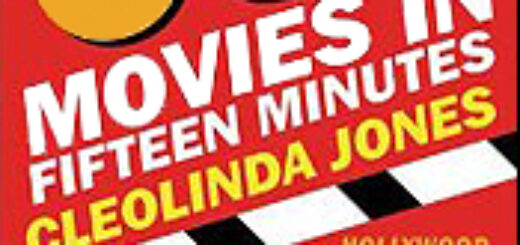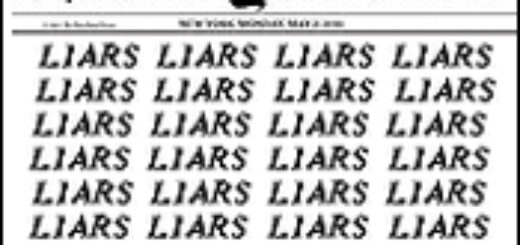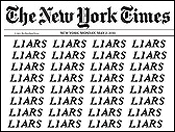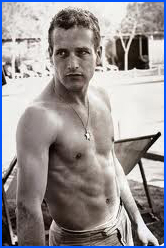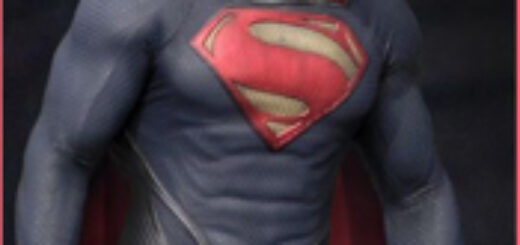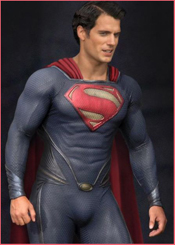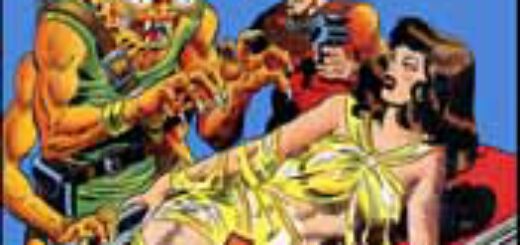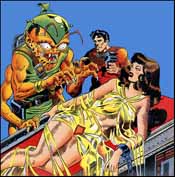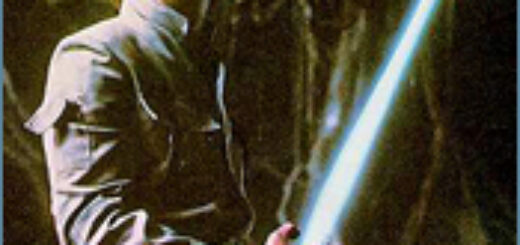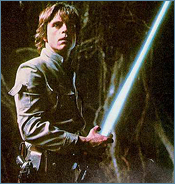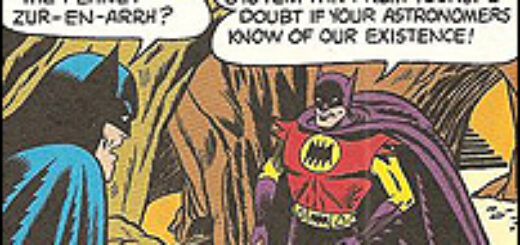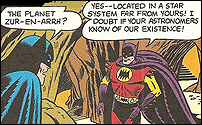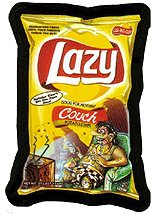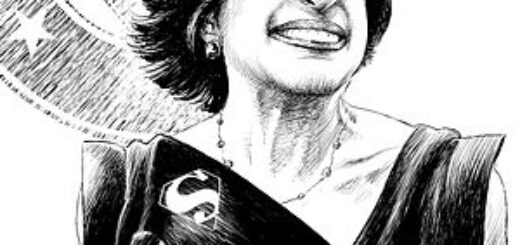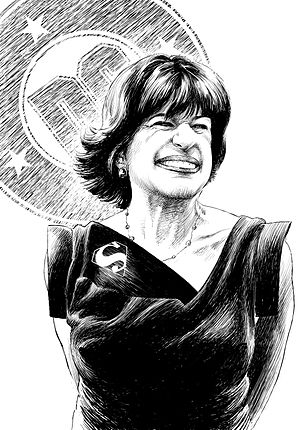Emily S. Whitten: Cleolinda Jones – Comic Book Movies in 15 Minutes
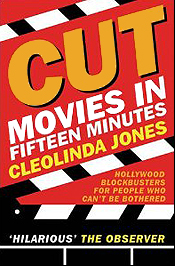 You don’t have to be born with a comic book in your hand to be a fan. As I’ve mentioned, my early exposure to comics was mostly in the form of movies and TV. These days, I read comics too; but I know a lot of fans who’ve primarily discovered comics through the movies, and often stay mostly with that medium.
You don’t have to be born with a comic book in your hand to be a fan. As I’ve mentioned, my early exposure to comics was mostly in the form of movies and TV. These days, I read comics too; but I know a lot of fans who’ve primarily discovered comics through the movies, and often stay mostly with that medium.
Some of those people take that movie fandom and turn it into something awesome. One such is Cleolinda Jones, prolific blogger and author of numerous hilarious movie parodies called Movies in 15 Minutes (there’s also a book). Although one thing she’s known for is being the Internet’s top Twilight snarker, she also writes really interesting discussions of comic book movies.
Recently, there’s been a flurry of talk about who gets to be a geek, and I agree completely with John Scalzi’s assessment that anyone who shares a love of geeky things is just as much of a geek as anyone else, and that we can all come at our love of pop culture and fandoms from very different backgrounds and tastes. Given all that, I thought it might be fun to get the perspective of an awesome female author and blogger who’s so known in pop culture and geek circles that people have actually written articles studying her blogging habits and who clearly fits into comic book fandom but doesn’t come at it from the usual angle of reading comics. Also Cleolinda is just awesome and fun to interview! So here we go!
What kind of exposure have you had to comics generally – as a reader, a viewer, etc.?
Um… there were some tiny comics that came with my She-Ra dolls? I remember walking past racks and racks of comics at the grocery store every weekend and being really intrigued, but I was a very quiet, bookish child, and didn’t even bother asking my mother if I could have one. When I was in my 20s, I started picking up graphic novels based on which movies I had become interested in, and Watchmen on its general reputation.
How did you get into comics movies, and what was the first one you watched (as a child, and/or in the modern resurgence of comics movies)?
I think it says a lot about the genre that I don’t think of them as “comics” movies – I think of them as superhero movies and thrillers and action movies and whatever genre the actual story happens to be. I mean, technically, you could say that The Dark Knight and Wanted and From Hell and 300 are all “comics movies,” but if you say “comics,” I’m generally going to think “superheroes.” And those are such a box-office staple that it’s hard to think of them as something you get into, you know? They’re just there, and everyone goes to see them, and there are so many of them that some of them are awesome and some of them aren’t.
The first superhero movie, certainly, that I remember was Tim Burton’s Batman in the summer of 1989. I was probably ten or eleven at the time, and didn’t actually see it until it was on HBO a year or so later, but I remember that it was a big damn deal at the time. That black and yellow logo was everywhere, as were the dulcet purple strains of “Batdance.” Maybe it’s the Tim Burton sensibility that really got me into Batman movies initially; Batman Returns is pretty much my favorite Christmas movie ever, shut up. I just straight-up refused to see the Schumachers at all. But I’m a Christopher Nolan fangirl, so that got me back in. Which may be the roundabout answer to the question: I get into these movies depending on who’s making them and/or who’s playing the characters. Nothing I read or saw about Green Lantern really attracted me from a filmmaking point of view (well, I love what Martin Campbell did with Casino Royale, there is that), so, in a summer crowded with movies, I didn’t go see it. And, you know, I’ve had Green Lantern fans tell me they really enjoyed it; that’s just the kind of choice you end up making with the time and money you have when you’re more interested in movies as a medium than comics.
What are your thoughts on the accessibility of comics movies, as someone who doesn’t primarily read comics? Are there any you found incomprehensible or confusing because you didn’t know the source material? Which do you think has been most successful as an adaptation for non-comics-reading viewers?
Well, despite my lack of comics-reading background, I usually hit up Wikipedia to get a vague idea of what happened in the original storyline. So the moment I heard that Bane was the TDKR villain, I went and looked it up and immediately wailed, “Noooooo I don’t want to see Bane [SPOILER SPOILER’S SPOILERRRRR]!” Because I keep up with movie news very closely, I knew when Marion Cotillard was cast that she would probably be [SPOILER]. And then, of course, they mixed it up a little anyway.
I guess The Avengers could have been confusing – which was something I lampshaded a little in the Fifteen Minutes I did for it, the umpteen previously on bits. But I felt like they explained it fairly well as they went. I had randomly seen Captain America (“It’s hot. Which movie you wanna see?” “Uh… that one? Sure”), so I knew the Tesseract back story, but I didn’t see Thor until two weeks after I saw The Avengers. But pop cultural osmosis plus the explanations in the movie meant that I understood the Loki business just fine; all seeing Thor did was give me more specific punchlines. (I do think that humor relies on knowing what you’re talking about, so I usually do a little research after I’ve seen something when I’m going to write it up.) Really, though, it’s hard to say. I’m usually aware enough of the movie’s background by the time I see it that I’m not confused. I mean, I’m already aware that Iron Man 3 is using the Extremis storyline, and there’s some kind of nanotech involved, and an Iron Patriot? Something – not enough to be spoiled, per se, but enough to have a frame of reference going in.
Just going by the numbers, it seems that The Dark Knight and The Avengers have been incredibly successful adaptations – and I don’t even mean in terms of money, but in terms of how many people flocked to those movies, saw them, enjoyed them, and were willing to see them again. You don’t make a billion dollars without repeat viewings. And that indicates to me that these movies were rewarding experiences for people, rather than frustrating or confusing (the Joker’s Xanatos gambits aside). And I think familiarity helped in both cases, though through different means. The Joker is obviously the most iconic Batman villain; in fact, The Dark Knight actually skips the slightest whiff of genuine back story there, instead showing the Joker as a sort of elemental chaos, almost a trickster god who comes out of nowhere and then, as far we viewers are concerned, vanishes. There’s no background for non-readers to catch up on; the TDK Joker is completely self-contained. Whereas Marvel’s approach with The Avengers was to get the public familiarized with the characters, very painstakingly, with this series of movies that built up Iron Man as the popular backbone, and then filled in the others around him, either in their own headlining movies or as supporting characters in someone else’s. One movie started out with very recognizable characters, and the other endeavored to make the characters recognizable by the time it came out.
Have you read a comic because you saw a movie about it? Or, have you read a comic because you were going to see a movie about it? How did that change your movie viewing and fan experience?
I got interested in League of Extraordinary Gentlemen and read the trade paperback a few weeks before it came out – and then hated the movie. And you know, I think I would have actually enjoyed the silliness of it if I hadn’t “known better,” so to speak, so if it’s not already too late, I try to hold off on reading a book until after I’ve seen the movie. I did read Watchmen first – and did enjoy the movie. I think those are the only ones I’ve read beforehand, though. I did go pick up From Hell and a Sin City set, and I bought the second LXG series in single issues as well; I keep meaning to get V for Vendetta. I’ve never picked up a superhero comic. I just look at the vast history of Marvel and DC and think, where would I even start? (How could I even afford it? Do they have comics in libraries?) I’ve never even read the Sandman series, and that’s supposedly the traditional gateway drug for geek girls.
You write hilarious parodies about all sorts of movies; and the recent The Avengers in 15 Minutes is no exception. Can you talk a little about what it’s like writing the parodies (including how you started and your experience with that generally), and whether it’s any different for comics vs. other movies? Was there anything unique about writing The Avengers one?
Well, the short version is that I came home from Van Helsing (2004) and started writing a script-format bit on a whim; I thought it was just going to be one scene plunked into a Livejournal entry, but it took on a life of its own. I published a book of ten print-only parodies in 2005 with Gollancz; the original Spider-Man (2002) is in there, but there’s also fantasy, sci-fi, overly serious historical epic, etc., spread pretty evenly throughout. Looking back, I think The Avengers is the only other superhero movie I’ve done; 300, V for Vendetta, and Wanted might count generally. It helps for the movie to have some sense of silliness, or at the very least absurdity or over-seriousness. If nothing else, there’s something humorous about movies as a medium – the tropes they run on, the expectations, the necessary coincidences, the mundane things they conveniently skip, the way that this stuff just would not work in real life. And you can point this out and have fun with it without saying, “And that’s why this is a terrible movie.”
The real difference with the Avengers movie – the material it provided – was that it had all of these background movies leading up to it. So you immediately have more opportunities for cross-referencing and in-jokes, in addition to a running “previously on” setup. There were few comics-only jokes (although I did enough research to mention the Wasp and Ant-Man), because the movies themselves were plenty to deal with. Whereas the various Harry Potter in Fifteen Minutes writeups I’ve done played more on the “This Scene Was Cut for Time” idea, referencing the books and the plot holes incurred by leaving things out – what wasn’t there.
If anything, The Avengers was incredibly hard to do not because it was good, but because it was self-aware. I mean, I did Lord of the Rings, a trilogy I love, for the book, but I consider what I do to be “affectionate snark,” and… that’s kind of already built into The Avengers. So, while a gloriously absurd movie like Prometheus took four days and all I really had to do was describe exactly what happens, The Avengers took six weeks.
What’s your favorite comics storyline and/or character?
I seem to be drawn to characters who have just had enough and start wrecking shit. I think I’m so drawn to Batman not because I want to be rescued by him, but because I want to be him. I discussed last week how the Omnipotent Vigilante just can’t work in real life – but it works as a fantasy. Because every time I hear about something horrible on the news, or even just someone on the internet being a complete and utter asshole, I wish I could go be Batman and show up in the dark and scare the fear of God back into people (“Swear To Me!!!! 11!!”). Also, I didn’t really grow up with the more light-hearted TV version(s) of Catwoman; my frame of reference is Michelle Pfeiffer. And that’s a Catwoman whose story arc is almost a “vengeful ghost” story. She has been wronged, and now she’s back, and you are going to pay (maybe for great justice, maybe not). Whereas the Anne Hathaway Catwoman, while a really interesting character, is more about Selina wavering between conscience and self interest, not vengeance. And maybe that’s closer to the “cat burglar” origin of the character – which, again, speaks to how meeting these characters through movies may mean that you have a very different experience from a comics reader.
And then you have someone like Wolverine – I think my favorite scene in the entire series is in the second movie, where he ends up having to defend the school pretty much entirely by himself. You wish you could be that badass, in defense of yourself or someone (everyone) else. This also may be why I saw X-Men: First Class and kind of wanted an entire Magneto Hunts Nazis movie – and maybe why Magneto, even as an antagonist, is so compelling in the Bryan Singer movies. The X-Men universe has some genuinely interesting moral ambiguities, you know? Gandalf has a few legitimate grievances and now he is tired of your shit. *CAR FLIP*
Also, I have a little bit of grey hair at my temple that I wish would grow into a Rogue streak.
Marvel, DC, or neither?
You know, as much as I love Batman, I tend to be more interested in Marvel characters as a whole; not sure what’s up with that. Actually, it may be that Marvel has been so much more pro-active about getting movies made and characters out there; I like about three of the X-Men movies a lot, the first two Spider-Man movies are good (the reboot was good except for the feeling that half the story got chopped out, I thought), and now the Avengers-based movies are turning out really well. There’s just more to chose from on the Marvel side at this point.
Do you have more of a desire to pick up paper (or digital) comics to read after seeing a comics movie? Or do you prefer sticking with the movies?
I seem to be more interested in reading stand-alone stories, which is probably why I picked up Alan Moore books pretty quickly. Even if it’s a somewhat self-contained Marvel/DC storyline, it’s like… do I need to have read twenty years of story before this? Can I just walk in and start reading this, or am I missing volumes and volumes of context? And then, if I get really into this, are they just going to reboot the universe and wipe all of this out? And then you have to figure out what the movie was based on in the first place. I might be interested in reading the comics a particular movie is based on – but then you say, well, The Dark Knight Rises was inspired by ten different comics. If you put all that into a boxed set with a big The Dark Knight Rises Collection plastered across it, I would be more likely to buy that than if you shoved me into a comics store (complete with disdainful clerk) and said, “There Is The Batman Section, Chew Your Own Way Out.” The decades of stories and do-overs and reboots, the sheer flexibility and weight and history, are what appeal to a lot of comics readers, I guess, but they’re exactly what bewilder movie viewers, leaving them no idea where to start.
What comics movie are you most looking forward to in the near future; and is there a comic book story or character you’d like to see a movie about who doesn’t have one yet?
I’m curious to see how Man of Steel turns out, even though Superman has never done that much for me as a character. (That said, I always talk about “going into the Fortress of Solitude” when I try to seriously get some work done.) I once heard that Metropolis and Gotham are, metaphorically, the same city – one by day and the other by night – and I don’t know that there would be enough sunlight in a “gritty” Superman reboot, if that makes any sense. And I was just fascinated by the idea of Darren Aronofsky doing The Wolverine, of all things, but it looks like James Mangold is directing that now. And, you know, in checking on that, I see “based on the 1982 limited series Wolverine by Chris Claremont and Frank Miller.” I see the words “limited series” and “trade paperback rated Must Have” and I think, okay, maybe this is something I have a chance of catching up on first.
I would really, really like to see a Black Widow movie, at this point. As much as I liked Anne Hathaway’s Selina, I wonder if a character that arch doesn’t work better in small doses. I mean, I’d still like to see them try a spinoff movie, but somehow, I think Black Widow might work out better. Everyone’s remarked on how great a year it’s been for people actually going to see movies with active heroines – Katniss, Merida, Selina, Natasha, even warrior princess Snow White – and I’m hoping that idea sticks. I know that the comics industry in general has a problem both in writing about and marketing to women. Maybe movies can lead the way on that.
Thanks for a fascinating perspective on your comics (and movie) fandom, Cleo!
If you haven’t done so, check out Cleo’s comics thoughts and parodies and, until next time:
Servo Lectio!
TUESDAY AFTERNOON: Michael Davis and the Death of Batman
WEDNESDAY MORNING: Mike Gold Goes To A Party!

